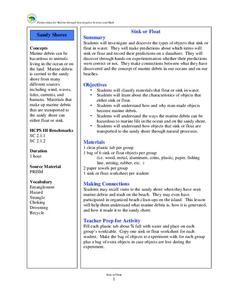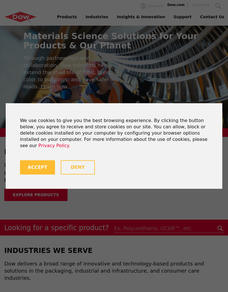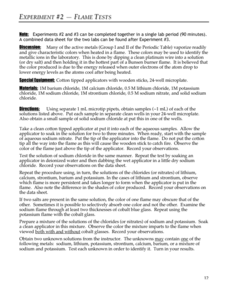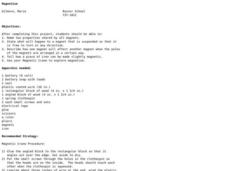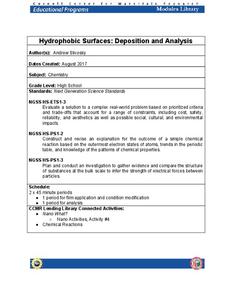Curated OER
Sink or Float
Students explore water properties by conducting a class experiment. In this buoyancy lesson, students make predictions as to whether or not specific objects will sink or float in water. Students conduct the experiment and record their...
Curated OER
Metals for Minting
Students study the Periodic Table to investigate basic properties of metals used to make coins. They discuss how historic events like the Civil War and Gold Rush had a direct impact on the trime.
Beyond Benign
Electron Transitions
Ready for a lab with a lot of razzle-dazzle? Young chemists observe flame tests of common salts through an always-popular activity. The updated resource focuses on observation skills, collaboration, and green chemistry practices.
Curated OER
The Elements
Fifth graders explore the differences between elements. In this elements and atoms lesson students complete an activity that shows how chemicals react to a flame test.
Curated OER
The Periodic Table
A huge collection of slides introduces chemistry learners to the periodic table of elements, electron configuration, and electronegativity. It opens with the history of today's periodic table, and then details the arrangement. After...
Curated OER
Use of Common Metals
In this metals worksheet, learners read about the different properties of aluminum, copper, and iron and determine why these metals are used they way they are used. This worksheet has 5 short answer questions.
Curated OER
Determination of Tensile Stress-Strain Common Properties in Materials
Students demonstrate the relationship between stress and strain, then graph stress-strain curves for various common materials. Students interpret graphed results and discuss differences in mechanical properties of materials.
Curated OER
Solids And Liquids
Students discuss the properties of solids and liquids. They complete a worksheet to show the boiling and melting points of several substances and consider if these factors affect how humans use materials.
Curated OER
Properties of Materials
In this material properties worksheet, students complete 6 activities in which they learn about and explore the differences between materials and properties. They collect objects and list off the materials and properties, answer...
Pingry School
Flame Tests
Light a fire in your pupils! Scholars conduct a flame test and observe the emission spectra of several different salts in an enlightening hands-on investigation. They use their observations to make comparisons and conclusions about the...
Center for Learning in Action
Challenge with Solids, Liquids, and Gases
There's a container for every matter—liquid, solid, and gas. Pupils design three different containers, each with the capability to hold one of the states of matter, and share their design with the class.
Curated OER
Make Your Own Periodic Table Worksheet
For this periodic table worksheet, students make their own periodic table using 12 given elements and their properties. Students use these elements to arrange them into the proper periods and families based on their properties.
Curated OER
The Halogens
In this chemistry worksheet, students answer 24 questions related to properties of halogens. They fill in the table with the correct answers and participate in teacher demo.
Curated OER
Magnetism
Students investigate the properties of magnets. For this magnetism lesson, students construct a magnetic crane and observe the attraction of metal objects.
Curated OER
Periodic Table
Students investigate the structure and development of the periodic table. In this periodic table lesson plan, students are given colored strips of paper that represent different atoms. They classify the atoms based on the paper's...
Curated OER
Investigating Materials
In this recognizing properties and changes of properties in matter worksheet, learners complete a chart of materials and their actions and then list things they would make with wood, glass, plastic, and metal. Students write about 30...
Teach Engineering
Electromagnets
Show your class what goes on with a magnet that can be turned on and off with a resource that provides the information needed to build an electromagnet. The information allows the class to understand that creating loops with the current...
Curated OER
Periodic Behavior of Oxides
Students investigate the properties of oxides and observe their periodic trends. In this behavior of oxides lesson plan, students experiment with metallic oxides and non-metallic oxides to determine if they are acid, basic or amphoteric...
Cornell University
Hydrophobic Surfaces—Deposition and Analysis
Couches, carpets, and even computer keyboards now advertise they are spill-resistant, but what does that mean? Scholars use physical and chemical methods to coat surfaces with thin films to test their hydrophobic properties. Then they...
Curated OER
GCSE Science-CHEMISTRY worksheet on THE NOBLE GASES - Group 0 of the Periodic Table
For this periodic table worksheet students complete a fill in the interactive set of questions using a set of vocabulary words that describe the different elements.
Curated OER
Chemical Composition of American Coins
Young scholars investigate the chemical composition of pennies dated 1983 or later. In this chemical composition of American coins lesson plan, students scratch the surface of the penny to expose the zinc core. They put the penny in...
Curated OER
Periodic Table
In this periodic table worksheet, students are given 12 terms and must match the terms to their appropriate definition. Topics include types of bonds, types of elements, and types of ions.
Curated OER
Density - An Introduction
Students experiment with objects of different densities. In this density lesson, students examine same-sized objects with different weights, then look at a teacher explanation of density. Students make wave bottles and a density jar to...
Curated OER
What's the Attraction
Students sort objects based on magnetism. In this magnetism lesson, students are given a variety of objects, then predict whether the object will be attracted to a magnet and test their hypothesis as they sort the objects into "yes" and...


